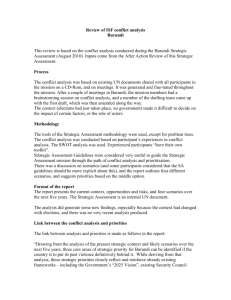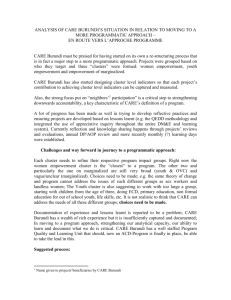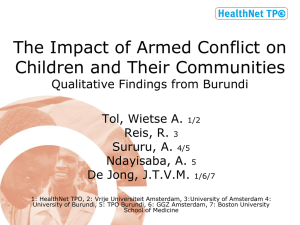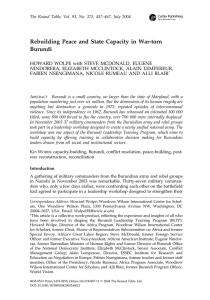Records Management in the Government of Burundi By: Anthea Seles
advertisement
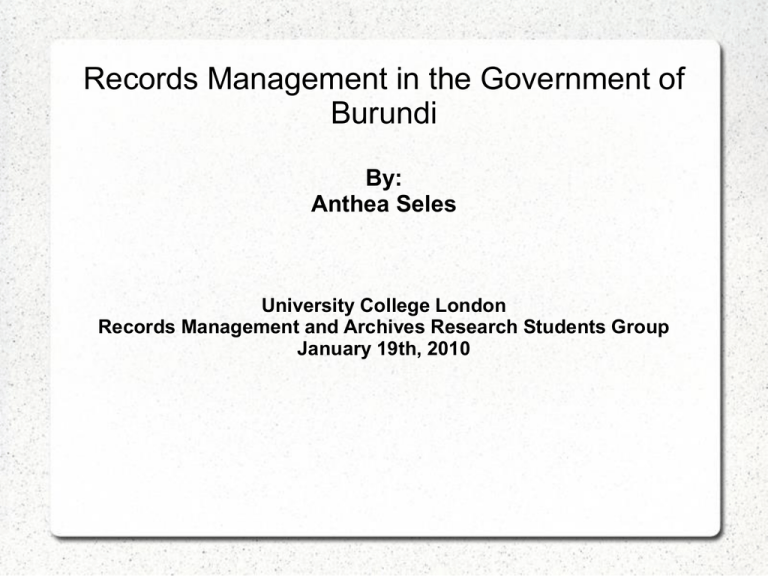
Records Management in the Government of Burundi By: Anthea Seles University College London Records Management and Archives Research Students Group January 19th, 2010 Overview Facts about Burundi Brief History of Burundi Project Overview Government Ministries and Agencies Surveyed Records Management, Information Communication Technology, and E-Government Initiatives in Burundi Conclusion Facts about Burundi Population: 8.9 million people Religions: Catholic (65%), Protestant (25%), Islam (13%) Three ethnic groups: Tutsi (14%), Hutu (85%), and Twa (less than 1%) Two official languages: Kirundi and French Kiswhili (Swahili) is in use as well but it is a non official language Brief History of Burundi c.1680- Kingdom of Burundi founded by Mwami Ntare Rushatsi 1890- Became part of German East Africa 1904- Establishment of a German protectorate 1916- Belgians take over governance of Burundi 1961- End of Belgian rule with the election of Prince Louis Rwagasore Brief History of Burundi 1965- Hutu revolt. Lead to one of the first ethnocides in the country this time against Tutsis 1966- End of Burundian monarchic rule. Marks the beginning of four military regimes. 1972- Hutu revolt in which 3,000 Tutsis lost their lives but the government reacted by killing 200,000 educated Hutus. This event created a deep divided among the ethnic groups which lead to the 1993 genocide. Project Overview Research funded by the Canadian International Development Research Council (CIDRC) Research is being conducted by the International Records Management Trust (IRMT) Examining the role of records management in Information Communication Technology (ICT), EGovernment and Access to Information initiatives in the East African Community (EAC) Project Overview The research on records management in Burundi and Rwanda added as an extension to the project. Examined government ministries, agencies, and departments in Tanzania, Kenya, and Uganda prior to extension. Burundi trip took place between December 5th-19th . Lead investigator was Dr. Justus Wamukoya (Information Studies Department, University of Moi, Kenya) Government Ministries and Agencies Surveyed The Auditor General's Court (Archives Director/Clerk) University of Burundi (Head Librarian/Head of IT) Central Bank of Burundi (Archives Director) National Archives of Burundi (National Archivist) Ministry of Telecommunications, Information Communication, and Parliamentary Relations (Permanent Secretary) Ministry of Public Health (Archives Director, Head of Human Resources) Ministry of Interior (Permanent Secretary) Ministry of Justice (Permanent Secretary, Head of website and IT program) Ministry of Finance (Permanent Secretary, Head of IT, Integrated Financial Systems Coordinator) Executive Secretariat of Information Communication Technologies (Executive Secretary) Ministry of Public Service (Head of Payroll Processing) Records Management, Information Communication Technology, and E-Government and Access to Information Initiatives in Burundi Limited information communication technology projects and e-Government projects being implemented. Not a government priority but EAC priority No access to information legislation being considered at this point in time Strategic development document 2011-2016 Records Management, Information Communication Technology, and E-Government and Access to Information Initiatives in Burundi Limited or no records management in government ministries Not a government priority, nor a priority at the ministries What are the problems? Records Management Archives Law Records management cadre Knowledge about recordkeeping Lack of government or senior ministerial backing t Technology seen as the panacea for records management issues This translates into lack of resources What are the problems? ICT and e-Government Capacity Lack of infrastructure Lack of government backing Lack of understanding Conclusion State of recordkeeping and records management in a state of disarray Records are regularly lost resulting in administrative delays ICT and e-Government initiatives are more of a priority but still don't have enough support for centralised implementation. National Archives of Burundi National Archives of Burundi National Archives of Burundi Conclusion Perfect time for information sessions on the value of records management Ideal moment to discuss recordkeeping and records management issues, given the early states of ICT and e-Government program planning Need build records management cadre and professional body
